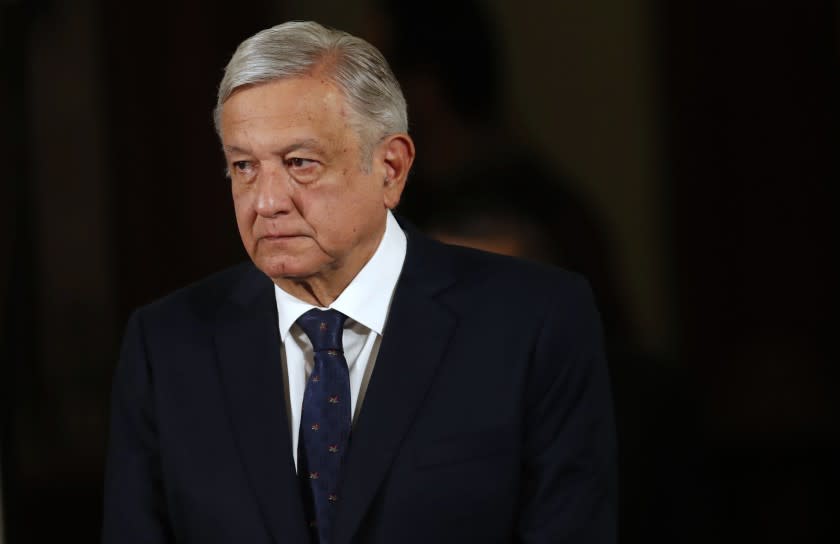Op-Ed: Mexico's president is as heedless as Trump in the coronavirus crisis

A narcissist leader who thinks the global coronavirus pandemic is a conspiracy against him. A head of state stubbornly refusing to accept any criticism or take actions other world leaders have embraced to protect their populations. A president slow to recognize the gravity of the situation and quick to downplay it so things can go back to being all about his transformation of his country.
Americans should be very worried about what’s happening as the coronavirus spreads in Mexico, where President Andrés Manuel López Obrador — AMLO — behaves at times like his counterpart in the White House.
In the best of circumstances, COVID-19 would amount to a significant tragedy for our southern neighbor, with its fragile healthcare system and a vulnerable economy. Now AMLO’s mismanagement is threatening to turn a public health crisis into a far greater calamity. And a cataclysm in Mexico, America’s largest trading partner, with deep ties to California, will have serious knock-on effects in the U.S.
Much like Trump, López Obrador is contemptuous of technocratic expertise, and he would prefer to keep politicking for his vanity project, the soufflé of nostalgic nationalism and populism known as the “Fourth Transformation,” rather than respond to a public health crisis.
As late as March 29, AMLO was still traveling the country, caught on video walking up to a pickup truck carrying the mother of Joaquín “El Chapo” Guzmán, the notorious drug cartel leader now in a U.S. prison, and shaking her hand through an open window. Then in April he defied calls to embrace aggressive fiscal support for the economy, citing an aversion to debt and the impropriety of past government bailouts to ailing industries. COVID-19, he said on a Sunday prime time address that supplemented his endless weekday press conferences, was just a “transitory crisis” in a nation whose strengths outweigh its weaknesses.
It’s hard to share his optimism. There is growing distrust (including on the part of Mexico City’s overwhelmed government) in official federal statistics about the disease that show some 31,000 confirmed cases and more than 3,000 deaths. Mexico has the lowest testing rate among Organization for Economic Cooperation and Development countries, and is slowly reevaluating the cause of death of people who’ve recently died from “atypical pneumonia.”
Meanwhile, Mexico’s economy (already in a slight recession since 2019) relies heavily on remittances from workers on this side of the border, as well as tourism earnings and oil revenues. Remittances were surprisingly high in March, as Mexicans rushed to repatriate savings at a stronger exchange rate, but you can imagine in which direction COVID-19 will point all these arrows over time.
The peso has lost roughly 20% of its value, and some analysts are expecting the Mexican economy to contract as much as 12% this year, a more severe crisis than expected in the United States or worldwide. Pemex, the state-owned oil company central to AMLO’s agenda, recorded an astonishing $23 billion loss in the first quarter. International rating agencies are downgrading Mexican sovereign debt.
Criticizing AMLO’s anemic response to the crisis is not an ideological attack. Governments all over the world on both the right and left have embraced massive stimulus programs, understanding that efforts to preserve the economy through the storm will minimize permanent damage. That’s why Republicans and Democrats in this country rushed to authorize trillions of dollars in emergency spending, with yet a fourth package under consideration.
AMLO’s 2018 landslide electoral triumph gave him and his leftist MORENA movement nearly unchecked power. What’s unclear now is whether his embrace of austerity (admittedly selective; he has lavished resources on pet projects that include an oil refinery in his home state and his beloved Maya Train across the Yucatan peninsula ) is a matter of personal principle or a Machiavellian plot to allow vast swaths of the private sector to be destroyed in service of the transformation he champions: turning back the clock on Mexico’s embrace of free markets. AMLO did say this crisis is like “a ring to the finger,” a Spanish idiom that might be better translated as “fits like a glove.”
The gravest danger amid AMLO’s mismanagement is that Mexico’s democracy might join the country’s economy on the list of COVID-19 victims. The rule of law has been under siege in Mexico since well before the pandemic. AMLO has a penchant for invoking “the people” via informal and highly partisan referendums known as consultas populares. In Mexico, these "consultations" have resulted in scratching a desperately needed new airport for Mexico City and threatening a U.S.-owned beer brewery project in Baja California. Both developments were in compliance with all legal requirements and had been contracted, but AMLO was able to put a halt to them by stirring up opposition among supporters in rigged plebiscites that are not part of any formal legal or electoral process.
It’s not much of a leap to imagine AMLO, in need of scapegoats as the coronavirus crisis deepens, relying on more consultas to justify the nationalization of certain industries, or reprisals against political opponents. Or even to contrive a popular demand to extend his constitutionally mandated single term in office. And a Mexico consumed by political instability, much like a global pandemic, is a horrific problem the U.S. hasn’t faced in a century.
Andrés Martinez is a professor of practice at the Cronkite School of Journalism at Arizona State University and a fellow at the New America think tank.

